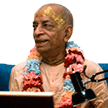Material Activities - an essential subject: Difference between revisions
(Created page with "Category:Essential Subjects <!----------------------- edit below this line -----------------------> <!------------------------ begin introduction text --------------------...") |
(Vanibot #0041: Moves Choose Another box to the end) |
||
| Line 2: | Line 2: | ||
<!----------------------- edit below this line -----------------------> | <!----------------------- edit below this line -----------------------> | ||
<!------------------------ begin introduction text ------------------------> | <!------------------------ begin introduction text ------------------------> | ||
Material life means defying the laws of God, denying the existence of God. And one wants to become himself God. These are the material activities. There is not much difference between the activities of material life and spiritual life. Only the consciousness has to be changed. When the consciousness is to lord it over the material nature, that is material life. The only distinction between materialistic activity and spiritual activity is that material activity is performed only to satisfy one's own senses whereas spiritual activity is meant to satisfy the transcendental senses of the Supreme Personality of Godhead. By spiritual activity everyone factually benefits, whereas by materialistic activity no one benefits and instead one becomes entangled in the laws of karma. | |||
Srila Prabhupada's books, lectures, conversations and letters offer a comprehensive presentation of this essential subject as seen in the '''[[Vaniquotes:Category: Material Activities| | Srila Prabhupada's books, lectures, conversations and letters offer a comprehensive presentation of this essential subject as seen in the Vaniquotes '''[[Vaniquotes:Category: Material Activities|Material Activities]]''' category. An introduction from his books is given below in the following 16 quotes. | ||
<!-------- end introduction text and don't touch next three lines ---------> | <!-------- end introduction text and don't touch next three lines ---------> | ||
---- | ---- | ||
== Quotes from Srila Prabhupada's books == | == Quotes from Srila Prabhupada's books == | ||
<!----------------- edit quote boxes below this line -----------------> | <!----------------- edit quote boxes below this line -----------------> | ||
{{VaniQuotebox| | {{VaniQuotebox|A person who is very much attached to material activity is called visayi. A visayi is an enjoyer of visaya, which means eating, sleeping, mating and defending|A person who is very much attached to material activity is called viṣayī. A viṣayī is an enjoyer of viṣaya, which means eating, sleeping, mating and defending. Nārada Muni is indirectly indicating through the story of King Purañjana that eating, sleeping, mating and defending are troublesome and risky. '''(Śrīmad-Bhāgavatam 4.25.9)'''}} | ||
{{VaniQuotebox| | {{VaniQuotebox|Just as a knowledgeable person can easily distinguish gold from iron, one who has the proper realization can easily distinguish the transcendental activities of the spiritual world from material activities|Just as a knowledgeable person can easily distinguish gold from iron, one who has the proper realization can easily distinguish the transcendental activities of the spiritual world from material activities. '''(Caitanya-caritāmṛta, Madhya-līlā 13.24)'''}} | ||
{{VaniQuotebox| | {{VaniQuotebox|A lusty person does not know that all his material activities are being observed by different demigods, especially the sun-god, and are being recorded for the karma of one's next body|As one looks forward to this opportunity, his eyes are overwhelmed by the beauty of his wife. Thus it is said that the whirlwind covers the eyes with dust. Such a lusty person does not know that all his material activities are being observed by different demigods, especially the sun-god, and are being recorded for the karma of one's next body. '''(Śrīmad-Bhāgavatam 5.13.4)'''}} | ||
{{VaniQuotebox| | {{VaniQuotebox|Material activities are the conditioned soul's only engagement. Not knowing the aim of life, the materialist perpetually wanders in material existence, struggling to get the necessities of life|A poor man belonging to the mercantile community goes to the forest to get some cheap goods to bring back to the city to sell at a profit. He is so absorbed in the thought of maintaining body and soul together that he forgets his original relationship with Kṛṣṇa and seeks only the bodily comforts. Thus material activities are the conditioned soul's only engagement. Not knowing the aim of life, the materialist perpetually wanders in material existence, struggling to get the necessities of life. '''(Śrīmad-Bhāgavatam 5.14.8)'''}} | ||
{{VaniQuotebox| | {{VaniQuotebox|Meditation is sometimes recommended as a way to check distracting materialistic activities. Meditation means stopping all nonsensical activities, at least for the time being|Cultivation of spirituality does not mean sitting down idly for meditation, as some pseudo-yogīs teach. Such idle meditation may be good for those who have no information of devotional service, and for this reason it is sometimes recommended as a way to check distracting materialistic activities. Meditation means stopping all nonsensical activities, at least for the time being. Devotional service, however, not only puts an end to all nonsensical mundane activities, but also engages one in meaningful devotional activities. '''(Nectar of Instruction, Text 3)'''}} | ||
{{VaniQuotebox| | {{VaniQuotebox|One has to cease all material activities and sacrifice all forms of so-called material happiness. If the aspiring transcendentalist fails, then he apparently loses both ways; in other words, he can enjoy neither material happiness nor spiritual success|When one takes to the path of transcendence, one has to cease all material activities and sacrifice all forms of so-called material happiness. If the aspiring transcendentalist fails, then he apparently loses both ways; in other words, he can enjoy neither material happiness nor spiritual success. '''(Bhagavad-gītā 6.38)'''}} | ||
{{VaniQuotebox| | {{VaniQuotebox|The purpose of elaborately describing the influence of time is to detach the conditioned soul from his material activities, which are considered to be simply a waste of time|In this Twenty-ninth Chapter, the glories of devotional service are elaborately explained, and the influence of time on the conditioned soul is also described. The purpose of elaborately describing the influence of time is to detach the conditioned soul from his material activities, which are considered to be simply a waste of time. '''(Śrīmad-Bhāgavatam 3.29.1-2)'''}} | ||
{{VaniQuotebox| | {{VaniQuotebox|One cannot be really renounced until one actually becomes disgusted with material activity and sees it as a stumbling block to spiritual advancement. Renunciation should not be phalgu, temporary, but should exist throughout one’s life|One cannot be really renounced until one actually becomes disgusted with material activity and sees it as a stumbling block to spiritual advancement. Renunciation should not be phalgu, temporary, but should exist throughout one’s life. '''(Caitanya-caritāmṛta, Madhya-līlā 16.238)'''}} | ||
{{VaniQuotebox|Those interested in materialistic activities remain in the cycle of birth and death|Those interested in materialistic activities remain in the cycle of birth and death. Pravṛtti-mārga, or the inclination to stay in the material world to enjoy varieties of sense gratification, has been explained in the previous verse. Now, in this verse, it is explained that one who has perfect brahminical knowledge rejects the process of elevation to higher planets and accepts nivṛtti-mārga; in other words, he prepares himself to go back home, back to Godhead. '''(Śrīmad-Bhāgavatam 7.15.52)'''}} | |||
{{VaniQuotebox|The sensual activities of the material world are to be purified by the process of devotional service, and thus the perfection of life can be attained simply by purifying the present position of our material activities|Originally, since all the senses are produced of the Lord's reservoir of senses, the sensual activities of the material world are to be purified by the process of devotional service, and thus the perfection of life can be attained simply by purifying the present position of our material activities. '''(Śrīmad-Bhāgavatam 2.6.1)'''}} | |||
{{VaniQuotebox|The sage feels transcendental pleasure in the gradual advancement of spiritual culture, whereas the man in materialistic activities, being asleep to self-realization, dreams of varieties of sense pleasure|The sage feels transcendental pleasure in the gradual advancement of spiritual culture, whereas the man in materialistic activities, being asleep to self-realization, dreams of varieties of sense pleasure, feeling sometimes happy and sometimes distressed in his sleeping condition. The introspective man is always indifferent to materialistic happiness and distress. He goes on with his self-realization activities undisturbed by material reactions. '''(Bhagavad-gītā 2.69)'''}} | |||
{{VaniQuotebox|Karma refers to the pious life or material activities performed during the day and the mental activities of dreams at night|The categories of emanations from the nonsubstance are two—activities and forbidden activities (karma and vikarma). Karma refers to the pious life or material activities performed during the day and the mental activities of dreams at night. These are more or less desired activities. Vikarma, however, refers to illusory activities, which are something like the will-o'-the-wisp. These are activities that have no meaning. '''(Śrīmad-Bhāgavatam 6.16.51)'''}} | |||
{{VaniQuotebox|Those who are ignorant of the benefits of devotional service must be educated by preaching. If one stops preaching and simply sits down in a solitary place, he is engaging in material activity|The word jīva-hiṁsā (envy of other living entities) actually means stopping the preaching of Kṛṣṇa consciousness. Preaching work is described as paropakāra, welfare activity for others. Those who are ignorant of the benefits of devotional service must be educated by preaching. If one stops preaching and simply sits down in a solitary place, he is engaging in material activity. '''(Caitanya-caritāmṛta, Madhya-līlā 12.135)'''}} | |||
{{VaniQuotebox|Those who engage in devotional service are unaffected by the results of their material activities. Otherwise, everyone, from the smallest microbe up to the King of heaven, Indra, is subject to the laws of karma|Those who engage in devotional service are unaffected by the results of their material activities. Otherwise, everyone, from the smallest microbe up to the King of heaven, Indra, is subject to the laws of karma. A pure devotee, being always engaged in the service of the Lord, is exempt from these laws. '''(Śrīmad-Bhāgavatam 9.2.14)'''}} | |||
{{VaniQuotebox|A Krsna conscious person is no longer interested in material activities and no longer takes pleasure in material arrangements like wine, women and similar infatuations|A devotees duty thus becomes self-illuminated by the grace of the Lord, and therefore he no longer has any obligations to the Vedic injunctions. Such a Kṛṣṇa conscious person is no longer interested in material activities and no longer takes pleasure in material arrangements like wine, women and similar infatuations. '''(Bhagavad-gītā 3.17)'''}} | |||
{{VaniQuotebox|One percent done in Krsna consciousness bears permanent results, so that the next beginning is from the point of two percent, whereas in material activity without a hundred percent success there is no profit|One percent done in Kṛṣṇa consciousness bears permanent results, so that the next beginning is from the point of two percent, whereas in material activity without a hundred percent success there is no profit. '''(Bhagavad-gītā 2.40)'''}} | |||
<!----------------- edit quote boxes above this line -----------------> | <!----------------- edit quote boxes above this line -----------------> | ||
| Line 31: | Line 47: | ||
'''Material Activities - [[Vaniquotes:Category: Material Activities|explore more within this category]]'''. | '''Material Activities - [[Vaniquotes:Category: Material Activities|explore more within this category]]'''. | ||
{{EsentialSubjectTotal}} | |||
<div style="float:left;"> | |||
{{EssentialSubjectnav}} | |||
</div> | |||
__NOTOC__ | __NOTOC__ | ||
__NOEDITSECTION__ | __NOEDITSECTION__ | ||
Latest revision as of 16:47, 22 November 2020
Material life means defying the laws of God, denying the existence of God. And one wants to become himself God. These are the material activities. There is not much difference between the activities of material life and spiritual life. Only the consciousness has to be changed. When the consciousness is to lord it over the material nature, that is material life. The only distinction between materialistic activity and spiritual activity is that material activity is performed only to satisfy one's own senses whereas spiritual activity is meant to satisfy the transcendental senses of the Supreme Personality of Godhead. By spiritual activity everyone factually benefits, whereas by materialistic activity no one benefits and instead one becomes entangled in the laws of karma.
Srila Prabhupada's books, lectures, conversations and letters offer a comprehensive presentation of this essential subject as seen in the Vaniquotes Material Activities category. An introduction from his books is given below in the following 16 quotes.
Quotes from Srila Prabhupada's books
Material Activities - explore more within this category.
Vanipedia has now over 903 introductory articles compiled from Srila Prabhupada's books under the series titled Essential Subjects. All these articles can be seen in the Table of Content on the right side of this article and also here in this Umbrella Category. Browse through them to relish the breadth and depth of Srila Prabhupada's teachings - There is a subject for everyone.














